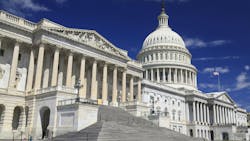Industry leaders to gather for NAMA Fly-In to advocate for effective legislative action
Convenience services industry leaders will convene in Washington, D.C., this week for the 2025 NAMA Fly-In and Advocacy Summit. This annual event serves as a hands-on means to educate national legislators about the impact of the nearly $40 billion convenience services industry and to advocate for provisions to support the industry.
Convenience services industry members will meet with congressional staff to discuss three key issues, NAMA notes.
The first is preserving key Tax Cuts Jobs Act provisions. Many provisions of the 2017 Tax Cuts and Jobs Act (TCJA) will expire at year-end, affecting convenience services businesses. According to an explainer developed by NAMA, the organization notes that tax policies support job creation and investment in infrastructure for improved access to food and beverages. Key provisions include maintaining marginal tax rates, supporting the qualified business income deduction, preserving estate tax exemptions and reinstating bonus depreciation.
The second issue is supporting the expansion of SNAP acceptance to convenience operators. The Supplemental Nutrition Assistance Program (SNAP) provides important nutritional support for working families with low paying jobs, low income older adults and people with disabilities living on fixed incomes, and other individuals and households with low incomes.
As NAMA notes in its explainer, food insecurity affects SNAP users, with many living in food deserts and facing time constraints. Convenience services can provide food access for at-home consumption, especially for full-time workers. Challenges include a lack of grocery stores and transportation issues for SNAP recipients. Convenience services already serve 40 million people daily and can help address food insecurity. The industry seeks to be included in SNAP to provide nutrient-rich food options.
The third issue concerns the impact of tariff uncertainty on the industry. NAMA notes that the convenience industry supports a strong domestic economy and balanced trade policies. Supply chains are complex, relying on diversified sourcing and manufacturing within the United States. At the same time, global supply chains are essential for key components such as coffee beans that cannot be sourced domestically. Tariff fluctuations pose challenges, including increased operational costs and heightened price sensitivity among consumers.
What they are saying
“Congress is working to extend a lot of those tax provisions in the One Big Beautiful Bill Act that President Trump is advocating for. We’re asking for Congress to keep section 199A that provides a 20% deduction on qualified business income for pass-through entities. Many of our convenience services businesses are small businesses — they’re pass-through entities that show up on personal income tax returns, said Michael Hogg, senior manager of state affairs for NAMA, in a pre-event video. “We’re asking to keep the current estate tax exemption as a way to preserve family-owned businesses for the next generation. Many convenience services operators are family-owned businesses, and limiting the estate tax exemption would harm the ability to pass that down.”
“Reinstating other tax provisions, including bonus depreciation and the research and experimentation tax credit — all of these tax items requests are designed to benefit small businesses and convenience services operators,” Hogg added.
“SNAP acceptance — if you’ve been involved with NAMA’s government affairs team in the last two years, you’ve definitely heard about this. We have traditionally not been allowed to accept SNAP as a form of payment, but that is no longer the case. We can accept it,” Hogg continued. “We're just asking Congress to support SNAP acceptance in the convenience services industry as USDA continues to evaluate and refine SNAP.”
“Finally, tariffs,” Hogg concluded. “We’re asking Congress to support balanced trade policies that create a vibrant business environment across the United States. We'd ask [that] if you’re experiencing the effects of any tariffs, talk about that. Highlight that. With all of the coffee that we offer, 99% of coffee beans consumed in the United States are imported and because we don’t have viable domestic production or means of production in the United States to produce coffee at the level that the United States drinks coffee. So any tariffs affecting coffee-producing countries, we’re going to see their effects.”
NAMA will host its fly-in on June 11-12 in Washington, D.C.
About the Author
Linda Becker
Editor-in-Chief
Linda Becker is editor-in-chief of Automatic Merchandiser and VendingMarketWatch.com. She has more than 20 years of experience in B2B publishing, writing, editing and producing content for magazines, websites, webinars, podcasts, newsletters and eBooks, primarily for manufacturing and process engineering audiences. Since joining Automatic Merchandiser and VendingMarketWatch.com, Linda has developed a new appreciation for the convenience services industry and the essential role it plays. She is dedicated to serving readers by covering the latest news in the vending, office coffee service and micro market industry. She can be reached at 262-203-9924 or [email protected].

